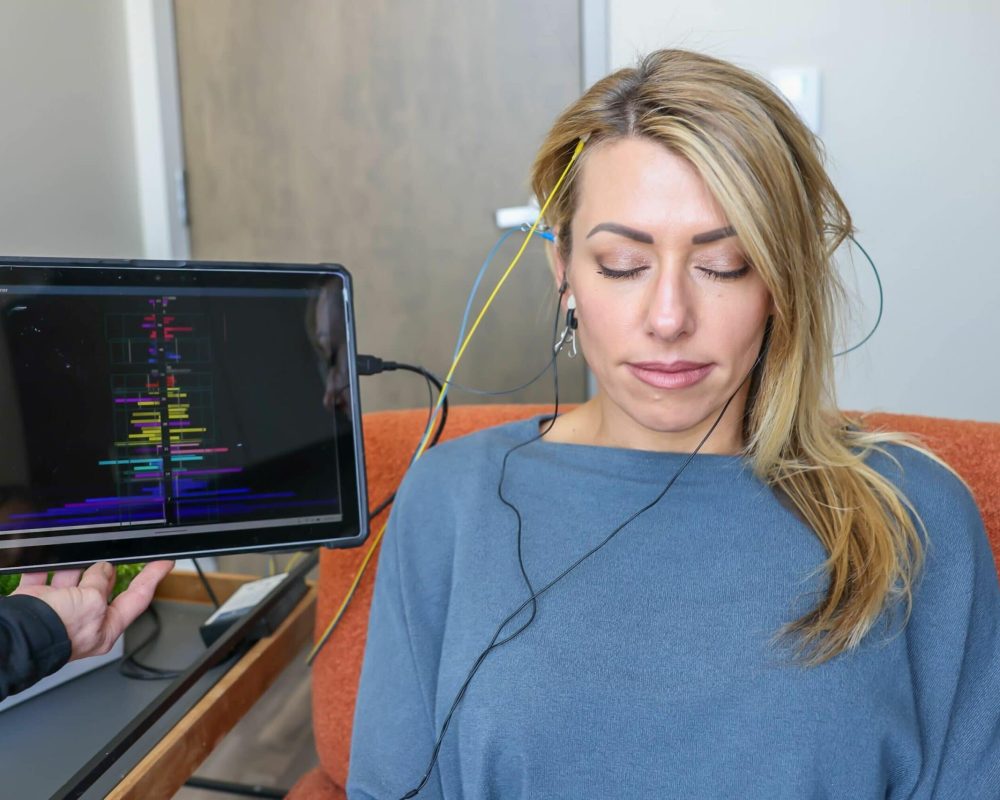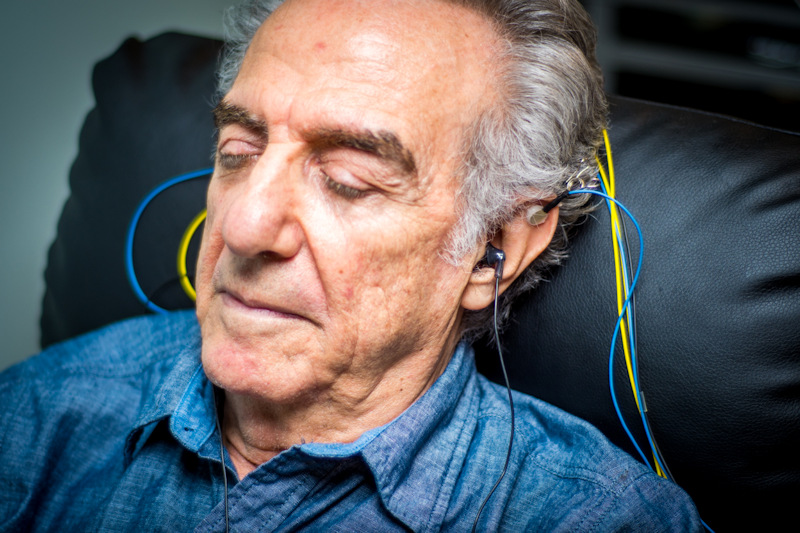Breaking Free from Anxiety: How Brainwave Entrainment Offers Hope

Rebecca stared at the ceiling again. 3:47 AM. Her heart raced as tomorrow’s presentation replayed in her mind. Sleep felt impossible when anxiety had her in its grip.
Anxiety and panic conditions negatively affect millions of people, often stealing the very thing our brains need most to heal: quality sleep.
But here’s something interesting. What if the solution isn’t just another turn on the medication merry-go-round? What if it’s actually retraining your brain to find its natural sleep and calm architecture again?
The Hidden Connection Between Sleep and Anxiety
Most people think anxiety causes sleep problems. That’s true, but it works both ways. Poor sleep actually makes anxiety worse, creating a cycle that feels impossible to break.
When you don’t sleep well, your brain’s alarm system gets stuck in the “on” position. Everything feels more threatening. Small worries become big fears. Every day stress turns into overwhelming panic.
Dr. Roberta Stevenson, a neurologist who works with brainwave entrainment technology, puts it this way: “Sleep is when the brain processes emotions and resets its stress responses. Without quality sleep, anxiety has nowhere to go.”
This process explains why people with chronic insomnia often develop anxiety disorders. And why do people with anxiety struggle to sleep? It’s one problem wearing two different masks.
Most anxiety treatments focus on managing symptoms rather than addressing the root cause. Medications like benzodiazepines or antidepressants can help in the short term, but they often come with side effects that make sleep problems worse.
Common issues with medication-only approaches include:
- Dependency concerns with anti-anxiety medications
- Sleep disruption from certain antidepressants
- Grogginess and brain fog the next da
- Withdrawal symptoms when stopping
- ance buildup requires higher doses
These medications definitely have their place in treatment. But many people want to try alternatives first, especially when sleep problems are at the heart of their anxiety.
How Sleep Recovery Programs Work Without Medication
Sleep Recovery takes a different approach. Instead of masking symptoms, they help retrain your brain’s natural sleep and stress patterns.
The Sleep Recovery tele-health program has been helping people since 2008 using FDA-approved brainwave entrainment technology. Their approach focuses on fixing the underlying brain wave irregularities that cause both sleep problems and anxiety.
Here’s how it works:
Brainwave Entrainment Technology: Your brain naturally produces different frequencies of electrical activity. When these get out of sync, you experience problems like racing thoughts, anxiety, and insomnia.
The program uses specific audio and light frequencies to gently guide your brain back to healthy patterns gently. Think of it like tuning a radio to get a clear reception.
Research published in medical journals reveals that photic light therapy can help reduce anxiety and improve sleep quality. A study in the journal “Pain Management” found that participants using theta light pulsation reported better sleep and reduced anxiety after just one week.
Another study with college students showed that audio-visual entrainment improved grades and socialization while reducing stress levels.
What the Process Looks Like: The Sleep Recovery program requires just 30-minute sessions every other day. It’s non-invasive and has no side effects.
Their goal for new clients is realistic: 6.5 to 8.5 hours of sleep per night, 5 to 6 nights per week, with an 85% reduction in overall anxiety. (Invisible results can vary.)
Real People, Real Results
The program has helped over 4,000 clients since 2008.
One parent shared how their 11-year-old daughter’s ADHD symptoms improved dramatically once her sleep patterns stabilized through the program. Better sleep led to better attention, less anxiety, and improved classroom behavior.
A 64-year-old man found relief after years of trying different sleep medications. His adult daughter noted improvements in both his sleep quality and overall anxiety levels.
Another client mentioned how the program helped with postpartum depression and anxiety that started with hormone changes after childbirth. The natural approach appealed to her because she was breastfeeding and wanted to avoid medications.
Why Sleep-First Approaches Make Sense for Anxiety
When you fix sleep problems first, anxiety often improves naturally. Here’s why this approach works:
Your Brain Gets Time to Reset. Quality sleep allows your brain to process the day’s stresses and reset emotional responses. Without this nightly “maintenance,” anxiety builds up like pressure in a covered cooking pot.
Stress Hormones Normalize
Good sleep helps regulate cortisol and other stress hormones. When these are balanced, you feel calmer during the day and less reactive to everyday stressors.
Better Emotional Regulation: A well-rested brain can distinguish between real threats and anxiety-driven fears. Sleep-deprived brains tend to catastrophize and jump to worst-case scenarios.
Physical Symptoms Decrease. Many anxiety symptoms (racing heart, sweating, muscle tension) happen because your nervous system is overstimulated from poor sleep. Better sleep calms these physical responses.
The Natural Alternative to Medication
Programs like Sleep Recovery offer hope for people who want to try non-medication approaches first. The technology is FDA-approved, has no side effects, and works with your brain’s natural healing processes.
Dr. Jefferey Wilson, clinical director at Sleep Recovery, explains: “We’re not adding foreign substances to the body. We’re simply helping the brain remember how to create healthy patterns again.”
The approach works for different age groups, too. Sleep Recovery has helped clients from age 3 to adults in their 80s. Young people especially benefit because their brains are still developing and more responsive to this type of retraining.
What to Expect During Treatment
Most people start seeing improvements within the first four sessions. David A. Mayen, their program director, walks you through the entire process and provides ongoing support through phone consultations.
Sessions happen every other day, giving your brain time to integrate the new patterns. Many clients describe the sessions as deeply relaxing, almost like meditation.
The technology works by detecting unstable brain wave patterns and gently correcting them. Over time, your brain learns to maintain healthier frequencies on its own.
Sleep Recovery’s programs work best for people whose anxiety is connected to sleep problems. If you’ve tried medications and want a natural alternative, or if you prefer to avoid side effects, this approach might be worth exploring.
Good candidates often have:
- Chronic insomnia lasting months or years
- Anxiety that gets worse when tired
- Racing thoughts at bedtime
- Preference for non-medication treatments
Getting Started
The Sleep Recovery program offers free consultations to discuss whether its approach fits your situation. You don’t need to sign up for anything to have an initial conversation.
Located in Irvine, California, they serve clients across all 50 states through their remote program options. The initial 4-session trial costs $599, giving you an option to try out the technology before committing to the whole 15-session program.
The Bottom Line
Anxiety and panic don’t have to control your life. While medications certainly help many people, they’re not the only option available.
Sleep Recovery programs offer a promising alternative by addressing the root cause of many anxiety disorders: disrupted brainwave patterns that affect both sleep and emotional regulation.
If you’re tired of feeling tired and ready to break the cycle of poor sleep and anxiety, exploring these newer technologies might give you the relief you’ve been searching for.
The best part? You’re partnering with your brain’s natural healing abilities, not pushing against them. Oftentimes, the most powerful solutions are the ones that help your body remember what it already knows how to do.
Your journey to better sleep and less anxiety could start with a simple phone call. After all, everyone deserves to wake up feeling rested, calm, and ready to face the day ahead.

